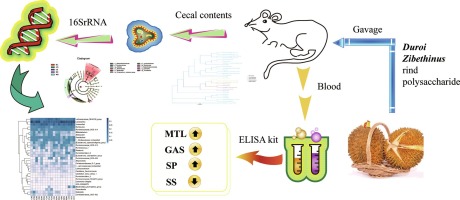Authors: Huimin Jiang, Jing Dong, Shengjun Jiang, Qiongxin Liang, Yan Zhang, Zhenhua Liu, Changyang Ma, Jinmei Wang, Wenyi Kang
Journal: Food Research International
October 2020, Volume 136, 109316.
https://doi.org/10.1016/j.foodres.2020.109316
中文简介:/henu/mu_syj/info/1061/1089.htm
·Durio zibethinus Murr rind polysaccharide (DZMP) for constipation was studied for the first.
·DZMP was found to promote gut hormones associated to the intestinal peristalsis.
·DZMP reversed the abnormal levels of SCFAs and gut flora in constipated SD rats.
·A number of gut bacteria were discovered to be closely related to constipation.
·DZMP is a safe and potential effective agent for treating constipation.
The prevalence of constipation increases rapidly with the increased pressure of some people’s life, which seriously affects the quality of life in related patients. In this study, the improvement of functional constipation by Durio zibethinus Murr rind polysaccharide (DZMP) and the effects of DZMP on intestinal microbiota were investigated in a constipation model of Sprague-Dawley (SD) rats established by loperamide hydrochloride. Results showed that DZMP at 200 mg/kg could signcantly (ifiP < 0.05) increase the intestinal transit rate, motilin, gastrin, substance P levels and concentration of short-chain fatty acids (SCFAs), reduce the somatostatin levels and improve the gastrointestinal peristalsis of rats. Sequencing showed that the Lachnospiraceae-NK4A136-group in the rats given 200 mg/kg DZMP (16.07%) was significantly higher than that of the model group (10.13%), while the Desulfovibrio was lower (2.99%) than that of the model group (4.19%). Principal co-ordinates analysis (PcoA) revealed a significant difference in intestinal microbiota composition between the model group and the high-dose DZMP group (200 mg/kg). The results demonstrated that DZMP has a regulatory effect of treating functional constipation and regulating intestinal flora in rats.




